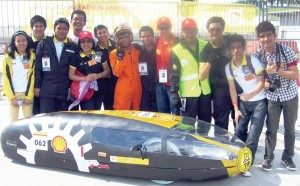Superstorm aftermath puts fuel economy issue in focus
Days after Superstorm “Sandy” ravaged eastern United States, the scene in New York and New Jersey looked like one from a post-apocalyptic Hollywood movie: long lines of vehicles snaked for kilometers around fuel stations while nearby streets were littered with abandoned cars and SUVs completely out of gas.
Even public transports and car service companies were forced to pull vehicles off the road as fuel stations remained out of fuel or power to run pumps.
It seemed like the last cars running were the small-engined ones that sip fuel miserly or those that employ hybrid technology.
This is perhaps the reason why Shell has been constantly searching for innovative ways to move more people and goods safely, cost-effectively and with reduced impact on the environment.
‘Smarter mobility’
Article continues after this advertisement“We call our approach ‘smarter mobility,’ which means helping people to meet changing mobility needs in smarter products, infrastructure and usage,” said Shell Eco-Marathon Asia technical director Colin Chi during a recent exhibition launch at the SMX Convention Center in Pasay City.
Article continues after this advertisementThe superstorm only highlights why events like the Shell Eco-Marathon should be supported.
Presented during the event hosted by Pilipinas Shell were student-teams from the University of the Philippines-Diliman, De La Salle University, Mapua Institute of Technology, Technological Institute of the Philippines and the University of San Carlos Cebu, which participated in last July’s Shell Eco-Marathon Asia held in Kuala Lumpur, Malaysia.
The exhibition launch was conducted as part of the Philippine Society of Mechanical Engineers’ 60th Annual National Convention, which was held simultaneously at the same venue and attended by engineering students from across the country.
Perfect timing
Pilipinas Shell VP for Communications Roberto Kanapi explained that the timing was perfect since the Shell Eco-Marathon encourages budding electrical, mechanical or industrial engineers to come up with concepts and ideas.
“The Shell Eco-Marathon is an annual global event conducted by Royal Dutch Shell that challenges student teams from around the world to design, build, and test ultra-energy efficient vehicles. Individual legs are held in the Americas, Europe and Asia winners of which are the teams whose vehicles go the furthest using the least amount of energy,” he added.
This year, 1,500 students from 18 countries across the Asia joined the marathon—held from July 4 to 7 at the Sepang International Circuit in Kuala Lumpur, Malaysia.
Team TIP Mileage, which received the “Best in Team Spirit Award” was declared the third-most fuel-efficient car in Asia—as well as the most fuel-efficient car in the Philippines—after its diesel-powered vehicle logged a 164 km per liter efficiency.
Taking home the Technical Innovation Award is the DLSU Team Proto, whose entry’s innovative battery management system and cruise control function was cited as the most advanced telemetry system among the participants.
The DLSU-Team Proto’s electric-battery-powered entry finished seventh in its category after setting a record of 270 km while DLSU’s Team Ice, competing in the gasoline category, finished eighth with 255 km per liter efficiency.
This Prototype category was once again won by Thailand’s Team Luk Jao Mae Khlong Prapa of Dhurakij Pudbit University, whose entry set a record of 2,903-km-per-liter efficiency.
In the Urban Concept category, Team UP’s battery-electric entry took the third place after ending up with a 73-km-per-liter efficiency. This category was won by Indonesia’s Team Cikal Cakrasvarna, whose entry achieved a mileage of 196.3 km.
“In terms of mobility, we have to be smarter. Mobility will be the name of the game in the next few years, and industries and citizens alike would be wise to address the effects of climate change now,” Kanapi said.
